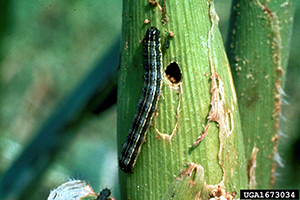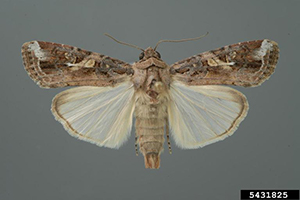Fall armyworm (Spodoptera frugiperda) is an exotic pest that has recently been detected for the first time in the Torres Strait and at the tip of Cape York in Far North Queensland.
The invasive moth’s larvae can cause significant and rapid damage to crops. The pest is known to feed on more than 350 different plant species, including fruit and vegetable crops such as sweetcorn, apple and citrus.
The Queensland Department of Agriculture and Fisheries has begun surveillance for the pest in the Atherton Tablelands, the wet tropics, Port Douglas, Mossman and Cairns.
Meanwhile, the Department of Agriculture, Water and Environment is implementing a fall armyworm national response plan with Queensland and Australia’s other states and territories.
The RDCs are working with the Australian Pesticides and Veterinary Medicines Authority (APVMA) and chemical registrants to gain access to minor use permits that will allow growers across various crops to use available insecticides for the management of fall armyworm if necessary.

Fall armyworm larvae. Image: University of Georgia , University of Georgia, Bugwood.org
Through the Plant Biosecurity Research Initiative, the RDCs, Plant Health Australia and the Department of Agriculture will work to identify gaps in our knowledge of the impact of fall armyworm in Australia, to guide any research, develop and extension activities necessary to respond to the detection of this pest.
It is important to note at this stage that the pest has not been reported to have established in Australia.
More information on fall armyworm, including how to identify and protect against the pest, can be found in this biosecurity information from the Queensland Government.
Early detection and reporting are essential.

